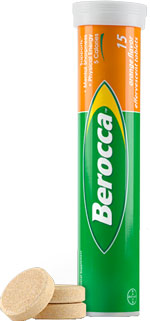 Ingredients
Ingredients- Citric acid
- Sodium hydrogen carbonate
- Vitamin C
- Magnesium sulphate
- Mannitol
- Calcium carbonate
- Magnesium carbonate
- Flavouring
- Sodium carbonate
- Niacin
- Sweeteners (Acesulfame K, Aspartame)
- Salt
- Zinc citrate
- Colour (Beetroot red, Beta carotene)
- Pantothenic acid
- Maltodextrin
- Riboflavin
- Thiamin
- Acacia gum
- Vitamin B6
- Partially hydrogenated soybean oil
- Sugar
- Trisodium citrate
- Antifoaming agent (Polysorbate 60)
- Folic acid
- Antioxidants (Alpha-tocopherol, Sodium ascorbate)
- Biotin
- Vitamin B12
Published June 2010
On its packaging, Berocca says that it contains "tailored vitamins and minerals to set you up for a really good day" which is somewhat of an exaggeration because it would only do this if you were lacking these in your diet, although for some people with unbalanced diets this might well be the case.
Ingredients
Citric acid and sodium hydrogen carbonate (aka bicarbonate of soda)
These two ingredients react chemically when added to water and they fizz as they generate bubbles of carbon dioxide.
Vitamins
Vitamin C (aka ascorbic acid, E300) is not something the body can store so we need at least 60 mg a day to remain healthy. Each Berocca tablet provides eight times this amount. Lack of this vitamin causes scurvy, an occupational hazard of sailors of old. Despite what the Nobel prize-winner Linus Pauling once claimed, mega doses of vitamin C do not prevent cancer.
Thiamin (aka thiamine, vitamin B1) can be lacking and this causes beriberi whose symptoms are weakness, pain, and a swelling of the body. Rarely met with in developed societies.
Niacin (aka nicotinic acid, vitamin B3) is needed to prevent pellagra, which was once widespread and common among prisoners in concentration camps and gulags where the diet lacked fish, poultry, and nuts which are rich sources. Symptoms included large running sores, lack of energy, and depression.
Pantothenic acid (aka vitamin B5) has no deficiency disease linked to this, but nevertheless it is vital to the body and it is essential to energy production and our ability to cope with stress.
Vitamin B6 is essential for making the amino acids that form proteins and it is necessary for it to release the glucose stored by the body as its source of instant energy.
Vitamin B12 (aka cobalamin) is unique among the vitamins in that its molecule has a cobalt atom at its centre with cyanide attached. It is important in the making of red blood cells and the functioning of the nervous system. The lack of vitamin B12 leads to pernicious anaemia. We need only 2 micrograms of this a day and half this comes from the bacteria living in our intestines. Berocca provides the equivalent of a week's supply.
Folic acid (aka vitamin B9) is especially important for women. If a woman who conceives and who lacks this vitamin she will have a high risk of her baby being born with spina bifida (exposed spine).
Biotin is vital to the skin, hair, nerves and sex organs and again intestinal bacteria provide most of the 150 micrograms a day which we need. Berocca will provide 130 micrograms.
Alpha tocopherol (aka vitamin E) is like vitamin C and an antioxidant which protects the body against free radicals.
Minerals
Calcium 99% of the calcium we absorb from our diet ends up in our bones but this metal also has a role in cells, blood clotting, and hormones.
Magnesium is essential for the smooth operation of muscles and enzymes. Certain beers such as Webster's Yorkshire Bitter have high levels.
Zinc is needed for enzymes and it is essential for the sex glands, especially the prostate. Lack of zinc in the diet leads to dwarfism and poor sexual development. Believed by some to help the immune system fight off illness.
Also included
Soya bean oil is rich in polyunsaturated linoleic acid and monounsaturated oleic fatty acids, the 'good' fats.
Sodium carbonate (aka E500) may also help produce the fizz.
Sugar, artificial sweeteners acesulfame K and aspartame, and maltodextrin are there to counteract the bitter taste of other ingredients.